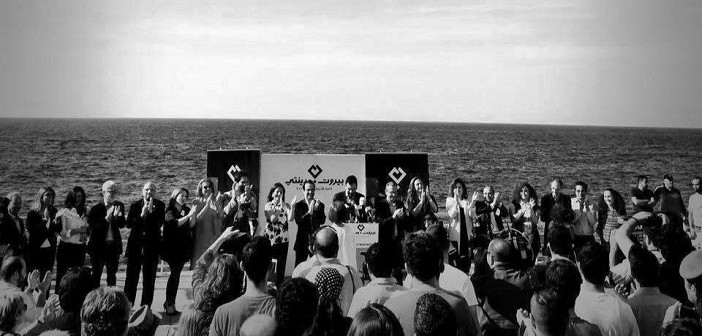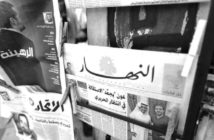The month of May 2016 marks a turn in the Lebanese municipality elections that are currently ongoing every week in a different district. A clear endeavour for change was particularly visible in the municipality elections that took place in Beirut on the 8th of May, with two electoral lists confronting each other: Beirut Madinati (‘Beirut, my City’), a volunteer-led campaign to elect a municipal council of qualified, politically unaffiliated individuals, a spectrum of candidates with extensive experience, the private sector, and public policy… and the Beirutis List backed by theFuture Movement and other parties. Despite the sweeping win ofthe former Prime Minister Hariri’s ‘Beirutis’ List, Beirut Madinati was able to gather 40 per cent of the votes, which underlines the impact of the civil society’s continuous attempts to improve living conditions in Beirut.
ملخّص
للمرّة الأولى، أراد اللبنانيون التغيير فاجتمعت نخبة من المحترفين والناشطين المدنيين تحت لائحة بعنوان “بيروت مدينتي” من أجل تغيير طريقة إدارة الشؤون في العاصمة. على الرغم من خسارتها لصالح لائحة “البيارتة” (المدعومة من تيار المستقبل وتيار الوطني الحر وأحزاب إسلامية باستثناء حزب الله الذي لم يشارك في الانتخابات) أثبتت لائحة “بيروت مدينتي” (التي حصدت قرابة 40% من الأصوات) أن هناك مثابرة من جهة المجتمع المدني على تحقيق مالم تستطع التوصل إليه حملة “طلعت ريحتكم” ألا وهو محاربة الفساد والزبائنية والمحسوبيات، وإيجاد حلول مستدامة لمشاكل إجتماعية واقتصادية تقوّض المجتمع اللبناني ومن أبرزها مشكلة النفايات. كما أثبتت هذه الانتخابات أنه متى اتحد اللبنانيون لتحقيق مطالبهم بمعزلٍ عن انتمائهم الطائفي والحزبي، اتّحدت الأحزاب اللبنانية لإسقاطهم.
The quagmire of renewal… Beirut, like many other Lebanese cities, suffers from institutional and structural deficiencies. Being an extremely polarized country, the work environment within all governmental organisations is heavily affected by corruption and nepotism. The lead architect for this patronage system is the Lebanese political elite, made of former warlords and survivors of the Lebanese Civil War, who have a solid grip on all influential positions in the country. Repercussions of this polarization and corruption have taken their toll on public services and on the basic needs of the population such as electricity, health care, and water, which have reached unprecedented levels of neglect as most Lebanese suffer from lack of electricity and water.
Today Beirut offers less than 1m2/person of green open space while the World Health Organization recommends at least 9m2/person.That is why a group of individuals has gathered to lead a campaign that addresses problems of affordability, mobility, waste management, air quality, public spaces, basic services, and municipal governance.Indeed, they all recognise the fact that our traditional political leadership has proven unable to responsibly manage urban affairs. Through this campaign, Beirut Madinati strives to reflect the following core values: primacy of the public good, social justice, transparency, and stewardship of our city for future generations.Hence, several lessons must be taken into consideration for the future.
In fact, Beirut Madinati has relied excessively on social media, which is a trap if not combined with more proactive steps on the ground. Indeed, the rate of the people who endorsed Beirut Madinati on social media was tremendously less in comparison to the amount of people who voted for them on the day of the elections. In addition, not all the supporters of Beirut Madinati on Facebook and Twitter vote in Beirut. Hence, this failure served as a counter-argument for the old generation of politicians to assert once again, that the system cannot cope with new radical changes and that the old system is the only one widely endorsed.
However, when scrutinizing the results, it is clear that the distribution of votes could have been different if the participation in the elections was higher. Indeed, the level of participation in the elections has reached a mere 20 per cent in Beirut and 49 per cent in the Bekaa region in eastern Lebanon. This also indicates that Beirut Madinati still has a long way to go; it has to take closer steps to the people and demonstrate its capabilities in order to rally more supporters.
Concerning the number of people who abstained from voting in Beirut, this indicates the level of neglect and lack of trust in any future change. Had the participation rate been higher, the final outcome might have made a difference. Nonetheless, one cannot disregard the impact Beirut Madinati had on the Lebanese oligarchs; it has unified sworn enemies, the whole Lebanese political class, who gathered in order to kill a movement for the people, by the people, asking for change, true to the saying: the enemy of my enemy is my friend.
In a nutshell, Beirut Madinati has underestimated the populist power of the political parties, and the reality remains that winning silver is losing gold, that is why if they are seeking to win the next elections, they must learn from their mistake and even if they lost this round they should work on fulfilling the promises they made in order to enhance their credibility.






1 Comment
Beeindruckende Artikel von einem talentierten Autor..